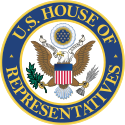U.S. House Ways and Means Committee
| Committee on Ways and Means | |
|---|---|
| 115th United States Congress | |
 |
|

Committee seal
|
|
| History | |
| Founded | December 21, 1795 |
|
New session started
|
January 3, 2017 |
| Leadership | |
|
Chairman
|
|
|
Ranking member
|
|
| Structure | |
| Seats | 39 members |
|
Political groups
|
Majority (24)
|
| Website | |
| waysandmeans |
|
The Committee on Ways and Means is the chief tax-writing committee of the United States House of Representatives. Members of the Ways and Means Committee are not allowed to serve on any other House Committee unless they apply for a waiver from their party's congressional leadership. The Committee has jurisdiction over all taxation, tariffs, and other revenue-raising measures, as well as a number of other programs including:
The U.S. Constitution requires that all bills regarding taxation must originate in the House of Representatives. Since House procedure is that all bills regarding taxation must go through this committee, the committee is very influential, as is its Senate counterpart, the U.S. Senate Committee on Finance.
Recent chairs have included Bill Thomas, Charlie Rangel, Sander Levin, and Dave Camp. On November 4, 2015 Representative Kevin Brady of Texas was chosen to succeed Representative Paul Ryan as chairman.
The idea of a ways and means committee to handle the financial matters of a legislature is an old one, having been used in the British Parliament and the colonial and early state legislatures in America.
The Committee was first established during the first Congress, in 1789. However, this initial version was disbanded after only 8 weeks; for the next several years, only ad hoc committees were formed, to write up laws on notions already debated in the whole House. It was first established as a standing committee by resolution adopted December 21, 1795, and first appeared among the list of regular standing committees on January 7, 1802. Upon its original creation, it held power over both taxes and spending, until the spending power was given to the new Appropriations Committee in 1865.
...
Wikipedia
